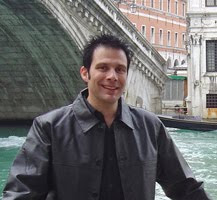E-mailer with a Social Conscience
I recently received an e-mail from someone who has been keeping up with the blog. Here is what that person wrote, and my reply:
Mass,
I’m a big fan of your music / productions, etc. I really enjoy reading your new blog, too. Anyway, I was wondering if you could recommend literature (titles) that may help put social crises into a clearer perspective. I’ve always been interested in activism; however, before one can contribute to a cause one has to understand the problems and WHAT MAKES THEM PROBLEMS. I’ve noticed over the years that while many punks and ‘scene-sters’ have their hearts in the right places, many of them don’t really know exactly what these issues are, and they eventually get bored and forget about them. I’d like to learn more and become socially responsible, so if you can recommend a title or two or have any advice to give, I’d appreciate it.
Thank you~ XXXXXX
First off, I appreciate the kind words, and especially the implication that what I have to say in regards to social crises has relevance to anyone other than myself. Secondly, I have to say that as much as I try to devote time and passion to being reasonably aware of the problems going on in the world, I am fully conscious that there are many very important and relevant causes with which I have only cursory familiarity, and several others of which I know absolutely nothing.
However, in order to help affect social change and do one’s part to improve the status quo, I do not think it is necessary to know everything. It certainly is good to know as much as possible about a least a few topics, and to inform oneself to a reasonable degree about as many others areas of concern as one can. What
is necessary is that everyone, or at least a majority of people in democratic countries, makes their opinions known through the way they vote, behave, buy, and speak out to the people around them.
General Reading:
The books and magazines I am recommending here are decidedly left-leaning. There are two reasons for this: First, while it is easy to find middle-of-the-road, and even conservative, information in classrooms, on the average newsstand, or on television, I believe that there is serious dearth of liberal thought available in the mass media, second, my own leanings are unmistakably left of the status quo, probably best described as “socialist,” although not necessarily in the sense of any actual party affiliation that claims that name. Regardless, a balance between the following sources and more traditional ones, such as
Time Magazine,
The Economist,
Foreign Affairs, C-SPAN, CNN, and established history and political science textbooks would most likely give the reader a better-rounded concept of the contemporary and historical sociopolitical landscape.
Books:
The Global Activist's Manual: Local Ways to Change the World by Mike Prokosch.
The Activist's Handbook: A Primer by Randy Shaw.
Activists Beyond Borders: Advocacy Networks in International Politics by Margaret E. Keck, Kathryn Sikkink.
A People's History of the United States: 1492 to Present by Howard Zinn.
Hegemony or Survival: America's Quest for Global Dominance (The American Empire Project) by Noam Chomsky.
Antonio Gramsci: Architect of a New Politics (Political Traditions in Foreign Policy) by Dante L. Germino.
Cultural Resistance Reader by Stephen Duncombe.
Power Politics by Arundhati Roy.
Magazines:
Z Magazine
Harper’s Magazine
The above books and magazines are great places to glean some intelligent liberal thought. In some cases, the arguments and angles presented are further left than I would personally venture. However, in context with the rest of the references in the list, and in addition to the more mainstream publications I mentioned earlier, I believe that one can cull enough information and philosophies regarding the current world situation (and possible improvements to it) to form educated opinions, and decide on proper courses of action for oneself.
In my own case, I have decided to support both the
Amnesty International and
Humane Borders organizations (links on the left side-bar) as much as I can.
 Amnesty International
Amnesty International has worked small miracles in the areas of women’s rights, religious freedom, the elimination of torture, the rights of political prisoners, and continue to focus on many other worthy issues all over the world. They are also currently at work to help prevent the deportation of illegal Haitian immigrants, many of which have not only risked their lives to escape extreme poverty, but also political imprisonment, torture, and execution.
By far the definitive book on Haiti, not only for the current political situation, but also historically, culturally, and socially, is
Haiti: The Breached Citadel by Patrick Bellegarde-Smith. This edition is currently out of print, but a second, and updated edition will be published in the upcoming months.
Another significant source for insight into Haitian and Haitian-American culture are the works of Edwidge Danticat. Although formally a writer of fiction, her books draw heavily from her own cultural experiences, and extensive research into the very real and grim realities faced by the Haitian people. Excellent examples of her work are
Breath, Eyes, Memory,
Krik? Krak!, and her latest,
The Dew Breaker, which I will be reviewing in an upcoming post.
 Humane Borders
Humane Borders focuses on preventing as many deaths as possible for the veritable flood of immigrants that walk through the desert to enter the United States from Mexico every year. The most recent estimates place the numbers at approximately 5 million people per year, and most of these people cross through highly dangerous stretches of the Arizona desert. Humane Borders runs over 30 water stations at various high-foot-traffic spots of desert along the U.S.-Mexico border, and provides over 10,000 gallons of water per year to walkers in danger of dehydration.
For more information on the perils faced by these immigrants, be sure to read
The Devil’s Highway, by Luis Alberto Urrea, which I reviewed in an earlier posting. Other pertinent books include
Coyotes: A Journey Through the Secret World of America's Illegal Aliens by Ted Conover and
Crossing Over: A Mexican Family on the Migrant Trail by Ruben Martinez.
The above is by no means a complete list of everything one can read to decide on what cause they wish to support, but it should certainly be a good start!
 The Dew Breaker by Edwidge Danticat
The Dew Breaker by Edwidge Danticat
 Across the Wire by Luis Alberto Urrea
Across the Wire by Luis Alberto Urrea
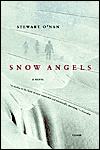 Snow Angels by Stewart O'Nan
Snow Angels by Stewart O'Nan
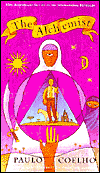 The Alchemist by Paolo Coelho
The Alchemist by Paolo Coelho
 Amnesty International has worked small miracles in the areas of women’s rights, religious freedom, the elimination of torture, the rights of political prisoners, and continue to focus on many other worthy issues all over the world. They are also currently at work to help prevent the deportation of illegal Haitian immigrants, many of which have not only risked their lives to escape extreme poverty, but also political imprisonment, torture, and execution.
Amnesty International has worked small miracles in the areas of women’s rights, religious freedom, the elimination of torture, the rights of political prisoners, and continue to focus on many other worthy issues all over the world. They are also currently at work to help prevent the deportation of illegal Haitian immigrants, many of which have not only risked their lives to escape extreme poverty, but also political imprisonment, torture, and execution.
 Humane Borders focuses on preventing as many deaths as possible for the veritable flood of immigrants that walk through the desert to enter the United States from Mexico every year. The most recent estimates place the numbers at approximately 5 million people per year, and most of these people cross through highly dangerous stretches of the Arizona desert. Humane Borders runs over 30 water stations at various high-foot-traffic spots of desert along the U.S.-Mexico border, and provides over 10,000 gallons of water per year to walkers in danger of dehydration.
Humane Borders focuses on preventing as many deaths as possible for the veritable flood of immigrants that walk through the desert to enter the United States from Mexico every year. The most recent estimates place the numbers at approximately 5 million people per year, and most of these people cross through highly dangerous stretches of the Arizona desert. Humane Borders runs over 30 water stations at various high-foot-traffic spots of desert along the U.S.-Mexico border, and provides over 10,000 gallons of water per year to walkers in danger of dehydration.
 Luis Alberto Urrea to Workshop a Portion of My Novel-In-Progress
Luis Alberto Urrea to Workshop a Portion of My Novel-In-Progress
 Aldo Giorgini of Italy made his first acquaintance with American customs in 1942 when a G.I. offered him some chewing gum. His viewpoint is being broadened considerably this year.
Aldo Giorgini of Italy made his first acquaintance with American customs in 1942 when a G.I. offered him some chewing gum. His viewpoint is being broadened considerably this year.
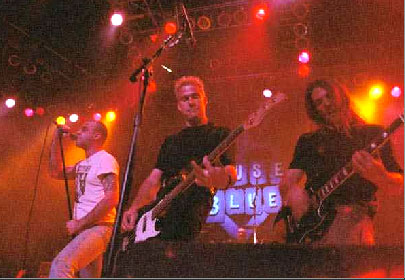 The Screeching Weasel website has undergone a major re-working. The site is much improved, and features several newer photos. The photo on the left is (left to right: Ben Weasel, me, John Jughead) from our Spring 2001 show at the House of Blues in Chicago.
The Screeching Weasel website has undergone a major re-working. The site is much improved, and features several newer photos. The photo on the left is (left to right: Ben Weasel, me, John Jughead) from our Spring 2001 show at the House of Blues in Chicago.
 Today I received a very welcome e-mail from one of my heroes. Apparently, while web-surfing he came across this blog, and felt inspired to write to me. Coincidentally, I had been thinking about Paul Mahern in recent weeks, and had been planning to write to him. That is the second such coincidence in my life in the past few weeks.
Today I received a very welcome e-mail from one of my heroes. Apparently, while web-surfing he came across this blog, and felt inspired to write to me. Coincidentally, I had been thinking about Paul Mahern in recent weeks, and had been planning to write to him. That is the second such coincidence in my life in the past few weeks.
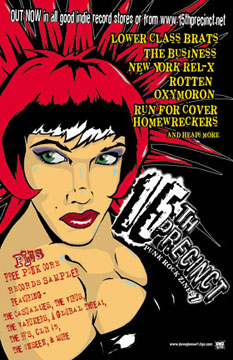 I just completed a 34-question interview conducted by Bianca Valentino of Brisbane, Australia. A few years ago, Bianca started a zine called 15th Precinct that is available widely in Australia, and in the U.S. through Interpunk. She recently won a prestigious Australian arts scholarship, and this award will help fund her ongoing writing projects, including the aforementioned zine and a book for which she is currently doing research.
I just completed a 34-question interview conducted by Bianca Valentino of Brisbane, Australia. A few years ago, Bianca started a zine called 15th Precinct that is available widely in Australia, and in the U.S. through Interpunk. She recently won a prestigious Australian arts scholarship, and this award will help fund her ongoing writing projects, including the aforementioned zine and a book for which she is currently doing research.
 An independent filmmaker based in Florida contacted me a couple of months ago in regards to a film he will be shooting at the beginning of May in the Tampa/St. Petersburg area. The director's name is Chris Fuller, and his film is entitled Loren Cass, and the story revolves around a small group of punk rock kids in search of what is missing from their lives. The entire film will include a punk rock soundtrack, with some of the lyrics of the songs working their way into the dialogue.
An independent filmmaker based in Florida contacted me a couple of months ago in regards to a film he will be shooting at the beginning of May in the Tampa/St. Petersburg area. The director's name is Chris Fuller, and his film is entitled Loren Cass, and the story revolves around a small group of punk rock kids in search of what is missing from their lives. The entire film will include a punk rock soundtrack, with some of the lyrics of the songs working their way into the dialogue.
 Luis Alberto Urrea earned the moniker “the Voice of the Border” through his unflinching portrayals of life in the slums of Tijuana in his books Across the Wire and By the Lake of the Sleeping Children. In his latest and best effort yet, the Devil’s Highway, he chronicles the tragic voyage of the “Yuma 14” -- the fourteen illegal Mexican immigrants who perished in the blistering heat of the Cabeza Prieta desert in an ill-fated attempt to enter the United States. The goal of these pour souls was simply to earn enough money to feed their destitute families in their remote Mexican villages.
Luis Alberto Urrea earned the moniker “the Voice of the Border” through his unflinching portrayals of life in the slums of Tijuana in his books Across the Wire and By the Lake of the Sleeping Children. In his latest and best effort yet, the Devil’s Highway, he chronicles the tragic voyage of the “Yuma 14” -- the fourteen illegal Mexican immigrants who perished in the blistering heat of the Cabeza Prieta desert in an ill-fated attempt to enter the United States. The goal of these pour souls was simply to earn enough money to feed their destitute families in their remote Mexican villages.
 Jessie
Jessie
